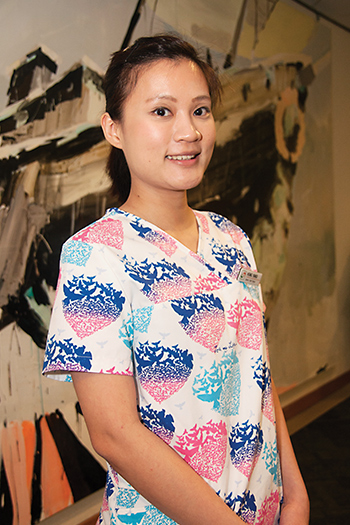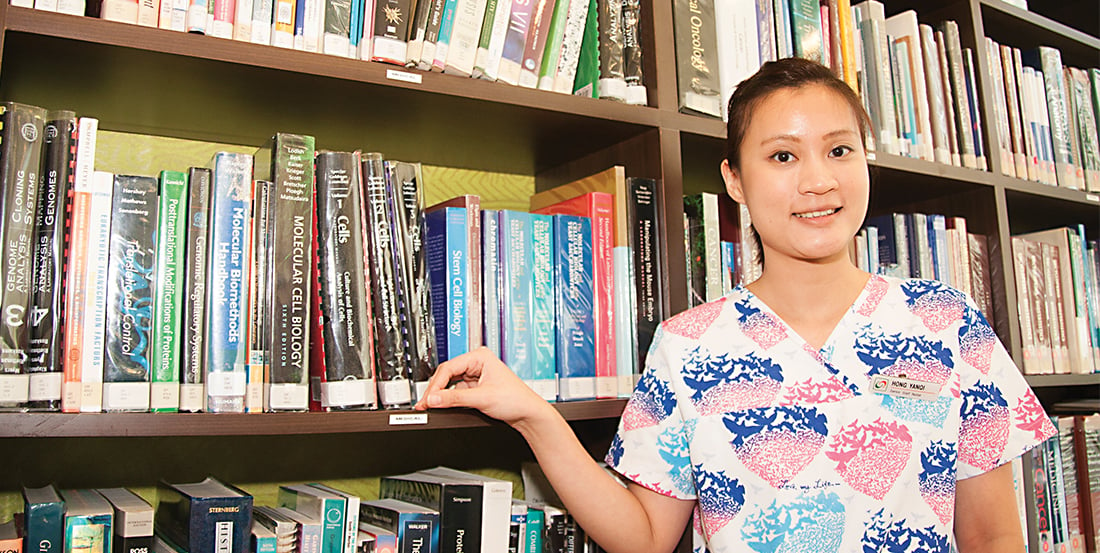C ancer is not an easy condition to deal with. To many, it is an uphill battle every day, a battle that they feel ill-equipped to deal with. This is where nurses such as Healthcare Scholar Hong Yanqi come into the picture.
Specialising in caring for people with cancer, oncology nurses walk hand-in-hand with patients through every step of their recovery process. They coordinate their patients’ treatments, help patients manage the symptoms of cancer and the side effects of treatment, as well as help patients and their families develop an understanding about the disease.
For Yanqi, nothing can replace the sense of fulfilment she derives from helping her patients. She tells us all about her career as an oncology nurse, giving us an insight into this rich and gratifying profession.
Why did you decide to pursue a career in healthcare?
Hong Yanqi: My interest sparked when I first joined the St. John Ambulance Brigade in secondary school. Over time, I was exposed to things such as home nursing and first aid which made my passion for healthcare grow. I enjoyed learning skills that allowed me to help people. Most importantly, I enjoy reaching out to people who need help.
Can you tell us about why you chose to specialise in oncology?
Yanqi: I have always been interested in it from a young age. So I supposed I can say that it was a calling of mine to go into oncology.

Hong Yanqi
Healthcare Scholar
Designation:
Senior Staff Nurse
My conviction in the field was cemented during one of my clinical attachments as a student. I met a cancer patient who suffered a lot of pain. When I saw him, I couldn’t help but feel that he did not have enough support. This pushed me to formally take up the specialty, in hopes that I could join the field, contribute by helping such patients, and suggest improvements to the healthcare system.
Tell us a bit about your role as a Senior Staff Nurse at the NCCS.
Yanqi: As nurses, we are the patients’ advocate. We speak out for them and act as the link between them and doctors and allied health professionals. Beyond that, I support patients, help them cope with the side effects of their treatment, and educate them about how to deal with their conditions.
Another aspect of my job is the training and guiding of new nurses. This is something I am glad to play a part in, because I have a keen interest in guiding the new generation of nurses. After all, one of the ways we can improve care is to nurture better successors.
I also contribute to several quality improvement projects. One example is the project to reduce medication errors. By making use of IT, it not only helps us reduce usage of paper, but more importantly it will reduce any possible mistakes made from trying to decipher illegible handwritings on paper! Furthermore, when we digitise medical records, we are assured that the information we access are accurate and reliable, thus improving the overall care for our patients.
What are some of the challenges you face in your profession?
Yanqi: Sometimes, it does get disheartening when you hear doctors, other healthcare professionals, and even patients say something like “you’re just a nurse”. We spend hours helping patients and tending to patients, keeping ourselves updated with the best evidence practices and conducting research to improve patients’ care and experience, so it does hurt when someone undermines the effort we put in.
However, there are plenty of instances that give us immense satisfaction. For instance, I remember one patient whom I assisted in his first round of chemotherapy. When he came in for his second round, I saw him sitting in a chair, so I greeted him. What surprised me was how grateful he was that I remembered him! He really appreciated the concern, telling me that I brightened up his day through that simple gesture. Little things like these make me remember that I am actually making a difference in someone’s life, and these make the job worthwhile.
There was also another patient I met two years ago who was suffering from cancer of the nose region. He had to go through months of radiotherapy and chemotherapy, which is honestly very draining for our patients. It is fulfilling to know that he is now coping very well despite his conditions. I’ll even say that he’s living life to the fullest, travelling all over the world and seeking out the joys in life.
Do you have any closing words for students who wish to follow your footsteps?
Yanqi: Nursing is an adventure and a journey. As you progress through the years as a nurse, you will discover what you want and who you want to be – not just in nursing, but in life as well.
Lastly, it is also important to believe in yourself. As a nurse, there are going to be times when you start to doubt yourself. You just have to persevere on and stick to your commitments, because you would eventually realise what a fulfilling and worthwhile profession it is.

